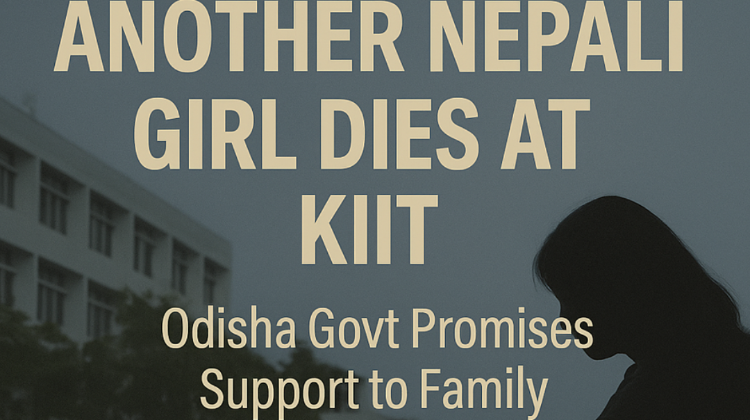Tragedy Strikes KIIT Again: 18-Year-Old Nepalese Student Found Dead, Second Such Case in 90 Days

Bhubaneswar — For the second time in less than three months, tragedy has
struck the Kalinga Institute of Industrial Technology (KIIT) in Odisha. An
18-year-old Nepalese student was found dead in her hostel room on Thursday
evening, raising alarming questions about student safety and mental health support
on campus.
The first-year B.Tech student in Computer Science, hailing from Birgunj in
Nepal — about 135 km from Kathmandu — was discovered hanging from a ceiling fan
in her hostel. Authorities have termed the case a suspected suicide, pending
post-mortem results.
Police were alerted around 8 PM, and forensic teams soon arrived at the
scene. "We received the information about the student’s death and
initiated an investigation. The scientific team has collected evidence, and her
family has been informed. The body has been sent to AIIMS Bhubaneswar for
autopsy," said Bhubaneswar-Cuttack Police Commissioner Suresh Dev Datta
Singh.
The death has not only shocked the campus community but also triggered
unease and renewed criticism over student welfare practices, especially
concerning international students.
A Haunting Déjà Vu
This heartbreaking incident follows the death of another Nepalese student,
Prakriti Lamsal, a third-year B.Tech student, who was found dead in her hostel
room on February 16. Lamsal’s death had stirred protests across the student
community, especially after it emerged she had filed a complaint of sexual
harassment against a fellow student — a complaint allegedly ignored by
university officials.
The lack of immediate institutional action in Lamsal’s case had drawn sharp
criticism, culminating in an indictment by the National Human Rights Commission
of India, which termed the university’s inaction as "gross
negligence." The accused student was arrested only after her death.
Now, with a second young life lost under similar circumstances, the pattern
has reignited outrage and concern among students, activists, and diplomatic
circles.
Mounting Pressure and Political Response
As news of the latest tragedy spread, calls for accountability grew louder.
Student groups, especially those representing the Nepalese diaspora, described
the deaths as part of a “disturbing pattern” of institutional apathy.
“This cannot be treated as a coincidence anymore. Two young girls from
Nepal, both full of dreams, lost their lives in the same hostel. We demand a
high-level, transparent probe,” said Samar Bahadur of the Akhil Bharat Nepali
Ekta Samaj.
The Akhil Bharatiya Vidyarthi Parishad (ABVP) echoed similar sentiments,
stating, “If the authorities continue to ignore these deaths, more lives could
be at risk. We want the university to come clean and take responsibility.”
Despite growing pressure, KIIT University has not released a formal
statement on the incident.
Government and Diplomatic Reaction
Odisha’s Department of Information and Public Relations expressed
condolences, adding that the state government was committed to a thorough and
impartial investigation.
Meanwhile, Nepal’s Foreign Minister, Arzu Rana Deuba, took to social media
platform X (formerly Twitter) to confirm that diplomatic efforts were underway
to ensure transparency. “The Ministry of Foreign Affairs has engaged senior
officials of the Indian and Odisha governments, as well as the Nepali Embassy
in Delhi, to uncover the truth. This is deeply saddening,” she wrote.
She also extended her sympathies to the grieving family and prayed for peace
for the departed soul.
Campus in Turmoil
The back-to-back tragedies have left students, especially international
ones, on edge. Many gathered late Thursday and early Friday near the hostels,
demanding safer living conditions, better mental health resources, and stronger
grievance redressal systems. Police presence has been intensified around the
campus to maintain calm.
As questions swirl around campus safety, mental health awareness, and
administrative accountability, the voices demanding change grow louder —
seeking not just justice, but prevention of future tragedies.









